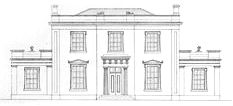Age
The narrator tells us that Collins is 25 years old.
Family and Situation
William Collins is the son of Mr. Collins Senior and a cousin of some kind of Mr. Bennet, from whom he will ultimately inherit Longbourn. We’re told from Mr. Bennet directly that the two had never laid eyes on each prior to the beginning of the novel, likely because of a longstanding argument between Mr. Bennet and Mr. Collins the elder.
William Collins is also the cousin of Jane, Elizabeth, Mary, Kitty and Lydia Bennet. Over the course of the novel, he meets and marries Charlotte Lucas.
As of the beginning of the novel, Mr. Collins has recently gained a living at Hunsford under the patronage of Lady Catherine de Bourgh. From all outside appearances, this is a mutually beneficial relationship.
Appearance
We are told “He was a tall, heavy-looking young man of five-and-twenty. His air was grave and stately, and his manners were very formal.”
Character
The narrator tell us “Mr. Collins was not a sensible man, and the deficiency of nature had been but little assisted by education or society; the greatest part of his life having been spent under the guidance of an illiterate and miserly father; and though he belonged to one of the universities, he had merely kept the necessary terms, without forming at it any useful acquaintance. The subjection in which his father had brought him up had given him originally great humility of manner; but it was now a good deal counteracted by the self-conceit of a weak head, living in retirement, and the consequential feelings of early and unexpected prosperity. A fortunate chance had recommended him to Lady Catherine de Bourgh when the living of Hunsford was vacant; and the respect which he felt for her high rank, and his veneration for her as his patroness, mingling with a very good opinion of himself, of his authority as a clergyman, and his right as a rector, made him altogether a mixture of pride and obsequiousness, self-importance and humility.” Lizzy comes to the conclusion that the practical reason to spend so much time with Lady Catherine would be that “there might be other family livings to be disposed of” and it is not entirely clear how much Mr. Collins really cares for Lady Catherine, how much is the novelty of the acquaintance and how much is politics.
It is likely that Mr. Collins comes from a family less established than the Bennets, evidenced by the fact that he assumes one of the Bennet daughters made dinner. Mr. Collins tells us from his first letter that he was ordained at Easter immediately prior, meaning that he’s been a parson for only about six months. Collins describes himself as “peculiarly bound to” pay obsequious attention to Lady Catherine with ridiculous complements and goes on at great length about her taste, judgment and character. It’s unclear how wide his circle of acquaintance may be beyond Lady Catherine; for instance, he says that “except Lady Catherine and her daughter, he had never seen a more elegant woman” than Mrs. Phillips, suggesting that either he has little idea of what actually constitutes elegance or he’s just a boundless flatterer.
Beyond these trappings, Lizzy thinks he’s pompous from the beginning and Mr. Bennet describes his letter to the family as having a “mixture of servility and self-importance.” We are told “Mr. Collins seemed neither in need of encouragement, nor inclined to be silent himself” when making conversation. About Lydia’s elopement he writes “I must not, however, neglect the duties of my station, or refrain from declaring my amazement at hearing that you received the young couple into your house as soon as they were married. It was an encouragement of vice; and had I been the rector of Longbourn, I should very strenuously have opposed it. You ought certainly to forgive them, as a Christian, but never to admit them in your sight, or allow their names to be mentioned in your hearing,” suggesting that his tendencies are somewhat Evangelical and not particularly enlightened as regards the church.
The narrator tells us that “Having now a good house and a very sufficient income, [Mr. Collins] intended to marry; and in seeking a reconciliation with the Longbourn family he had a wife in view, as he meant to choose one of the daughters, if he found them as handsome and amiable as they were represented by common report. This was his plan of amends—of atonement—for inheriting their father's estate; and he thought it an excellent one, full of eligibility and suitableness, and excessively generous and disinterested on his own part.” He attributes this plan to Lady Catherine, who presumably would rather not have a single parson kicking around her neighborhood. Lizzy thinks that really he’s searching for someone who will be “assisting to form a quadrille table at Rosings, in the absence of more eligible visitors”. This suspicion would seem to be confirmed by how few specifics he lays out in his reason for selecting Elizabeth as his bride and then the later willingness to switch affections over to Charlotte Lucas. If his father really was so cruel, it’s entirely possible that he never had a model of love before him to which he could aspire.
Habits and Hobbies
Mr. Collins’ habits would suggest that his upbringing was not that of a country gentleman. We know that he is a terrible card player - he loses every hand when he plays at the Phillips’. We’re told that he explains to Lizzy upon her arrival at Hunsford Parsonage that “To work in this garden was one of his most respectable pleasures.” We’re told he spends days “either at work in the garden or in reading and writing, and looking out of the window in his own book-room, which fronted the road.” As none of these are particularly the pastimes of a gentleman, it’s likely that he wasn’t brought up very high.
